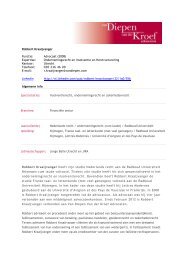© Van Diepen Van der Kroef Advocaten
© Van Diepen Van der Kroef Advocaten
© Van Diepen Van der Kroef Advocaten
- No tags were found...
You also want an ePaper? Increase the reach of your titles
YUMPU automatically turns print PDFs into web optimized ePapers that Google loves.
the functional necessity for that immunity. The case cited is therefore not relevant in theframework of the motions in the incidents. Even the United Nations itself, that may expressits view in the framework of the present proceedings, mentioned nothing in its explanation(compare Chapter ‘the submission of third parties’, un<strong>der</strong> point 8) over immunity.186. The judgment regarding Berahmi and Saramati of the ECHR states merely that the stateswho were sued, as suppliers of UN troops, could not be sued. It concerns therefore theattribution of possibly unlawfully conduct in the UN context, conduct that in this case mustbe attributed according to the European Court of Human Rights to KFOR (legal consi<strong>der</strong>ation141). The European Court of Human Rights emphasized with that besides that there wasmuch scope to consi<strong>der</strong> the circumstances in each case (legal consi<strong>der</strong>ation 151). There wastherefore no general rule given by the European Court of Human Rights for the attribution.The District Court manifested no such weighing of the circumstances of the case (eventhough a weighing or judgment of the attribution was not yet in issue). Whatever may bethe case, Article 6 ECHR was not relevant in the decision in question. Behrami and Saramatibrought actions against states, whereas they probably should have sued the internationalorganisation. Article 6 ECHR is not intended to offer protection against such a situation.Article 6 ECHR safeguards only access to the court. Article 6 ECHR does not guarantee thatthe party sued is the proper party.187. The judgment here discussed is also of an entirely different or<strong>der</strong> than the present case. Itis recorded un<strong>der</strong> point 17 of Chapter III (the circumstances of the Saramati Case) that:‘On 9 October 2002 the Supreme Court of Kosovo quashed Mr Saramati’s conviction and hiscase was sent for re-trial. His release from detention was or<strong>der</strong>ed. A re-trial has yet to befixed.’The right of access to the court un<strong>der</strong> Article 6 ECHR was not further reviewed because –contrary to what the the District Court evidently intended – that right was not in issue, andheedful of the quote above was also sufficiently safeguarded as such access to the court wasprovided in Kosovo. The European Court of Human Rights in the cases concerned gavemerely a general appraisal of the attribution in that case (see legal consi<strong>der</strong>ation 149:)‘Since operations established by UNSC Resolutions un<strong>der</strong> Chapter VII of the UN Charter arefundamental to the mission of the UN to secure international peace and security and since<strong>©</strong> <strong>Van</strong> <strong>Diepen</strong> <strong>Van</strong> <strong>der</strong> <strong>Kroef</strong> <strong>Advocaten</strong> page 79 of 99
















